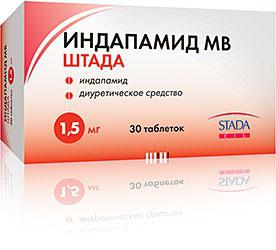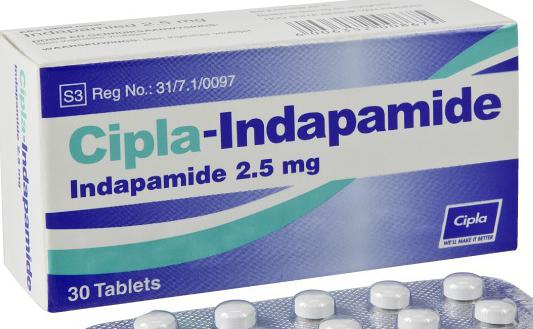The drug "Indapamide": reviews, pharmacological action, indications for use
The drug "Indapamide" is actively used to combat long-term and persistent hypertension. The drug has an effect on blood vessels and kidney tissue. It changes the permeability of cell membranes to calcium ions, as a result of which the contractility of the vascular walls decreases. This leads to a long-term decrease in blood pressure without sudden changes. The medicine has a number of popular analogues: "Arifon", "Indap", "Ravel", "Indapamide Shtada" and others.
Pharmacological action of the drug
The pharmacodynamics of the drug "Indapamide" is developing in several directions at once. In addition to relaxing the vascular walls, the active substance reduces precardiac load and promotes the dilation of arterioles. At the cellular level, the ability of sodium to be reabsorbed is inhibited, and the amount of urine produced increases slightly. Since these are long-acting tablets, taking the medicine provides round-the-clock monitoring of blood pressure. The product does not affect fat and carbohydrate metabolism, so it can be recommended for patients with diabetes and at different stages of obesity. A positive reaction is observed even in patients on chronic hemodialysis with regular use of the drug "Indapamide". Reviews from doctors indicate that taking the drug reduces the pronounced enlargement of the left ventricle.
Indications for use of the drug, methods of administration, dosage
The main indication for taking the drug is severe arterial hypertension, water and sodium retention in chronic heart failure. The drug "Indapamide" is taken orally:
- extended-release tablets containing 1.5 mg of indapamide - 1 pc. per day, without chewing, with water;
- capsules of 2.5 mg of indapamide - 1 per day, if necessary, the dose can be increased by 2-3 times.
Increasing the dosage does not enhance the hypotensive effect, only increases the amount of urine produced.

Contraindications to taking the drug "Indapamide". Reviews from patients, advice from pharmacologists
The drug has a number of contraindications and features that need to be taken into account when prescribing to patients:
- impaired renal and liver function, severe anuria;
- intolerance to the components of the drug;
- gout;
- pregnancy, lactation;
- age under 18 years;
- low potassium levels in the blood.
The drug "Indapamide" can cause exacerbation of a number of diseases (lupus erythematosus, complications of diabetes mellitus). When prescribing the drug to athletes, a positive test reaction for doping may be observed. If it is necessary to perform surgery under general anesthesia, the anesthesiologist must be informed that the patient is taking the drug Indapamide or its analogues. In the absence of contraindications and subject to compliance with the recommended dosage regimen, it is tolerated quite easily by patients.

Side effects of the drug
Frequent side effects of the drug Indapamide, according to patient reviews and clinical studies, include: increased fatigue, headache and muscle pain, and general weakness. Much less common are sinusitis, pharyngitis, dermatitis, disturbances in the functioning of the digestive system (nausea, constipation), and dry mouth. Very rarely the following may be observed: disturbances in blood composition, a sharp drop in pressure below normal, arrhythmias, dehydration of the body, blurred vision, pathological changes in the ECG and in blood and urine tests. Specific reactions to the drug "Indapamide" include: weight loss, increased sweating, decreased potency, chest and back pain.

Overdose, first aid in case of emergency
When a single therapeutic dose is significantly exceeded, the toxic properties of the drug "Indapamide" appear. Reviews from pharmacologists and clinical trials show that an overdose is observed when using at least 40 mg of the active ingredient. Intoxication of the body manifests itself in the form of vomiting, nausea, a sharp decrease in blood pressure, impaired renal excretory function, drowsiness, dizziness and even loss of consciousness. Timely gastric lavage and administration of activated charcoal to the patient is necessary to absorb and eliminate drug residues. Further treatment is carried out in a hospital and is aimed at relieving the symptoms of poisoning.

Interaction of the drug "Indapamide" with other medications
When prescribing a drug, it is worth taking into account the complex interaction of the drug "Indapamide" with a number of medications. Anti-inflammatory drugs reduce the hypotensive effect of the drug "Indapamide" and its analogues. With some combinations, it is necessary to replenish the fluid supply in time, since it is removed from the body more intensively. With dehydration, renal failure and severe hypotension may develop. If you combine Indapamide with cardiac glycosides, the latter can produce a toxic effect. Combining a radiopaque contrast agent with drugs containing indapamide may lead to the development of renal failure.
Conclusion
Today, drugs that include indapamide are considered an effective remedy against arterial hypertension. Compliance with the doctor’s recommendations during therapy with the medication in question will allow you to obtain a lasting long-term effect.




